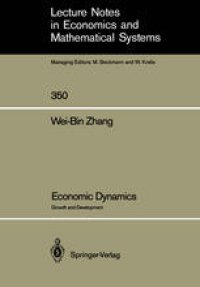
Ebook: Economic Dynamics: Growth and Development
- Tags: Economics general
- Series: Lecture Notes in Economics and Mathematical Systems 350
- Year: 1990
- Publisher: Springer-Verlag Berlin Heidelberg
- Edition: 1
- Language: English
- pdf
The theory of economic development is a branch of economic dynamics. Any discussion of the theory must involve dynamics even though not all dynamic problems are necessarily related to economic development. The theory's primary locus is upon the nice paths of economic variables. Stationary states, which have been the main concern of modem economic development theory, are actually special cases of economic dynamics. In this study, we propose an economic development theory within the framework of input-output systems and neoclassical economics. No political problems will be dealt with, although this does not mean that questions such as why Japan had a higher growth rate than China in the past are not important. Similarly, rather than dealing with the psychological and institutional aspects of in economic development processes we only suggest ways (or methods, as Hicks would call them) for analyzing what determines economic development from the point of view of "pure" economics. Our main contribution to economic growth theory is that we investigate various nonlinear dynamic phenomena such as bifurcations and economic cycles. We emphasize that oscillations and structural changes are not rare but universal in a progressive economy. No economic system can be stabilized forever if change is permitted.
This book deals with an important topic in economic theory: economic growth and development. It proposes an economic development theory within the framework of input-output systems and neo-classical economics. The standard topics in growth theory are re-examined in the light of newer results in nonlinear dynamic theory. There is a special emphasis on nonlinear unstable phenomena, such as bifurcations and structural changes, in economic development. Bifurcation theory provides an efficient tool for dealing with nonlinear dynamic systems. The book also emphasizes the concepts of adjustment speed and time scales in order to explore connections of different growth theories in the literature. Human quality (knowledge) plays a key role in explaining economic development.